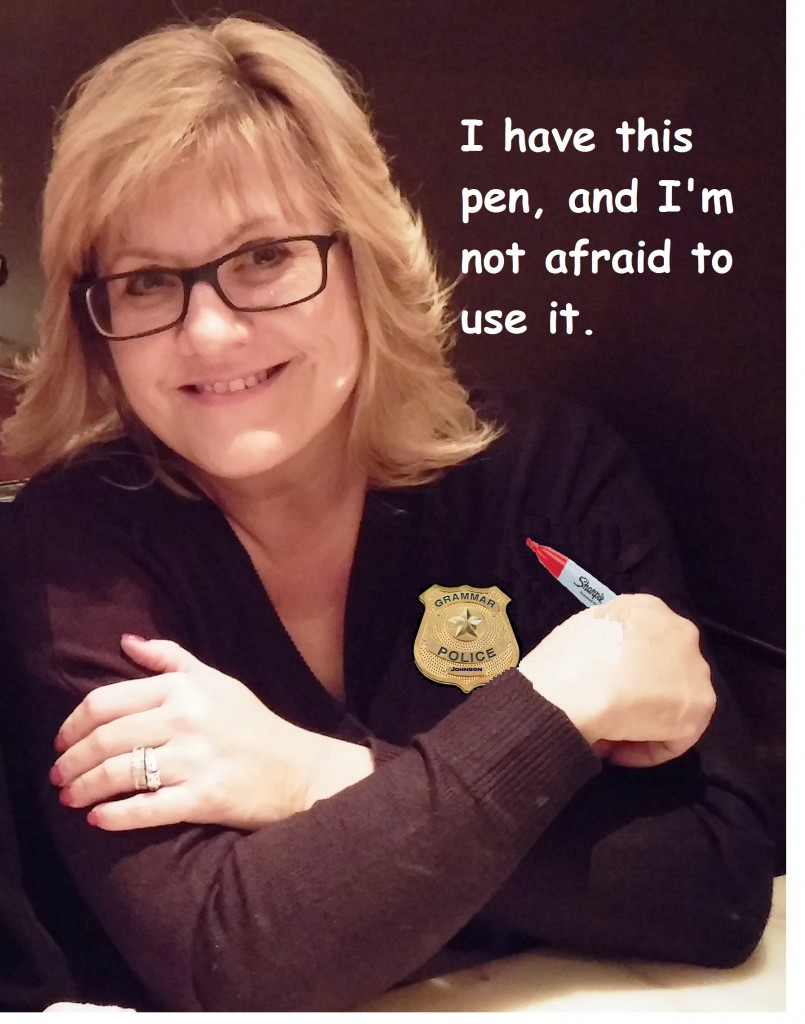Okay. I admit it. Sometimes…sometimes, I want to be a real-life version of Cameron Diaz in the only funny 15 seconds of the hideously horrible movie, Bad Teacher, and mark up my students’ papers in huge, red profanity. I mean, come on! Somebody show me a college or university that allows texting language in academic writing…although with the dumbing-down of our educational system, I’m sure that sooner or later, some brilliant “educator” will suggest that we bend the rules to accept texting slang “to meet students where they are.” I will die.
I love my students, and I am more than happy to contort myself to help them, but I draw the line at accepting lower case “i” for the personal pronoun. I mean it. If I see that lower case “i.” One. More. Time. My big, red “What THE?!” is going to be scrawled in student blood. (JK.)
 Although I am the Chief of the Grammar Police, I’m way too polite to kill anyone for stabbing me in the brain with grammatical gaffes even if it is clearly self-defense. Plus, I’d go to prison, and I just look like death in orange. For some grammar offenses, anyway, there will never be justice because it’s nearly impossible to teach 12 years of grammar in 12 weeks. (And…Autocorrect. Ohhhhh, that Godforsaken Autocorrect. If you rely on your telephone for correct spelling, and then you end up telling your grandmother that you really enjoyed her vagina instead of her lasagna, well, don’t say I didn’t warn you.) Standards are slipping because in addition to texting, an epidemic of non-reading threatens all that I hold holy.
Although I am the Chief of the Grammar Police, I’m way too polite to kill anyone for stabbing me in the brain with grammatical gaffes even if it is clearly self-defense. Plus, I’d go to prison, and I just look like death in orange. For some grammar offenses, anyway, there will never be justice because it’s nearly impossible to teach 12 years of grammar in 12 weeks. (And…Autocorrect. Ohhhhh, that Godforsaken Autocorrect. If you rely on your telephone for correct spelling, and then you end up telling your grandmother that you really enjoyed her vagina instead of her lasagna, well, don’t say I didn’t warn you.) Standards are slipping because in addition to texting, an epidemic of non-reading threatens all that I hold holy.
Scientific data from some study blah, blah, blah shows that people have a much larger auditory/speaking vocabulary than their reading vocabulary, which is then larger than their writing vocabulary. That means that people learn most of their words from hearing them, so recognizing many words in print or actually writing them proves to be a challenge. As a result, we English teachers encounter things like this: “My goals is to keep up with the paste”, “I want to past this class“, “I have to deal with stuff on a daily basics”, “This class really peeped my interest“, “So I will keep trying until I get it down pack” and “You can do anything that you put your mine to.”
Annnnnnd, my soul just died.
However, as the Grammar Police Chief, it is my duty to restore peace and harmony to the writing community. If I train my blinding spotlight on these 7 common offenses, perhaps the community will pull together and eradicate these blights. A girl can dream.
1.) Plural nouns are not formed with an apostrophe and “s.” Really. I mean it.
If you can read this, and you think it is correct, you had maybe not so great teacher’s. (Evillllllll!)
If you can read this, thank your excellent teachers. (Ahhhhhh!)
2.) Definitely is definitely not spelled defiantly.
3.) If you start in past tense, for the love of God, you must stay in past tense. (Or vice versa.)
Yesterday, we were in the Wal Mart parking lot, when this guy comes up and starts yelling at me for no reason. (Gaaaacckkkk!!!)
**Special note: If you cannot locate the shift in tense, please just go ahead and stop reading. You’re done.
4.) When the antecedent (the noun for which a pronoun “stands in”) is singular, you must use a singular pronoun. And for the last time, their is not a singular pronoun.
Anyone who leaves their dog at the kennel after hours will need to call Dan’s Express Pet Crematorium and Super Hibachi Buffet. (Nooooooo!!!)
Anyone who leaves his/her dog at the kennel after hours will need to call Dan’s Express Pet Crematorium and Super Hibachi Buffet. (Yessssssss!!!)
5.) Internet should be capitalized. What is the aversion to an upper case “I”?? Sheesh.
6.) The objective case of a personal pronoun (me, her, him, us, them, you, it) receives the action of a verb or acts as the object of a preposition.
Mother baked a cake for Sally and I. (No, no, no, no, no)
Mother slapped Sally and I. (No, no, no, no, no)
Mother did NOT bake a cake for “I”! She baked a freaking cake for me. For me! ME, dammit! And, she didn’t slap “I” either. She slapped m… But, I’d rather not talk about that. Look, I know some well-meaning first grade teacher told you that it’s always “so-and-so and I,” but she lied. She also told you that the classroom hamster went to live on a nice farm, and you fell for that too! So, stop it. Just stop it.
7.) And, finally, believe it or not: formatting dialogue has rules! Those little quotation mark thingies do more than just look like tiny eyelashes. They go around the actual words that someone speaks so that readers will know the actual words that someone speaks. But, really, this is a topic for another day…
 Today we’re proud to feature Jon Pearson as our seventeenth Authors Talk series contributor, sharing his thoughts on harnessing creativity in his podcast, “Our Minds All Have Giant Backyards.”
Today we’re proud to feature Jon Pearson as our seventeenth Authors Talk series contributor, sharing his thoughts on harnessing creativity in his podcast, “Our Minds All Have Giant Backyards.”